Tejas Networks Bundle
Who Really Owns Tejas Networks?
Understanding the ownership structure of a company is crucial for investors and strategists alike. The story of Tejas Networks SWOT Analysis, a prominent player in the telecommunications sector, offers a compelling case study in this regard. From its founding in Bangalore, India, to its current status, the evolution of Tejas Networks' ownership has been marked by significant shifts and strategic decisions.
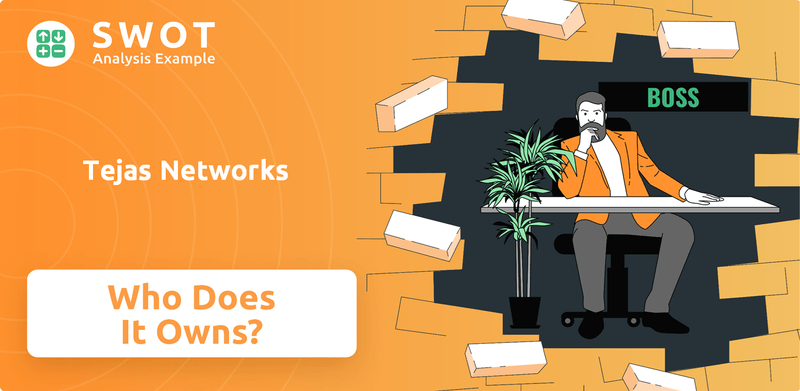
This exploration into who owns Tejas Networks delves into its ownership history, from founder stakes to the impact of its parent company, and the implications for its future. The acquisition of Tejas Networks has reshaped its market position, making it essential to understand the key players and their influence. Discover the answers to questions like: Who is the current owner of Tejas Networks and is Tejas Networks a public company?
Who Founded Tejas Networks?
The story of Tejas Networks began in 2000, with its foundation laid by Sanjay Nayak, Arnob Roy, and Kumar N. Sivarajan. Initial backing came from Gururaj Deshpande, setting the stage for the company's journey in the telecommunications sector. This early phase was crucial in shaping the company's direction and laying the groundwork for future growth.
Sanjay Nayak played a pivotal role, serving as CEO & MD from the company's inception until his retirement in 2023. His leadership was instrumental in transforming Tejas Networks from a startup into a publicly listed entity, achieving a multi-billion-dollar valuation. Kumar N. Sivarajan, an academic from the Indian Institute of Science, Bangalore, and an expert in optical fiber, joined as CTO. Arnob Roy, an ex-colleague of Nayak, completed the founding team and currently holds the position of Executive Director & COO.
The company's early focus was on developing advanced network technologies designed for high-speed data transfer and efficient traffic management. By 2002-2003, Tejas Networks had already secured ten customers, demonstrating early market traction and the viability of its technological approach. This early success was a key indicator of the company's potential and its ability to compete in the evolving telecommunications landscape.
Sanjay Nayak, Arnob Roy, and Kumar N. Sivarajan were the founders of Tejas Networks. They brought a combination of business acumen, technical expertise, and industry knowledge to the table.
The company received initial funding from Gururaj Deshpande, a key supporter in the early stages. This early investment was critical for the company's initial operations and growth.
Tejas Networks concentrated on developing intelligent network technologies for data transfer and traffic management. This focus helped the company to establish a strong position in the market.
The company went public in June 2017. The IPO drew significant interest from institutional investors, which helped to boost its capital.
Anchor investors in the IPO included Abu Dhabi Investment Authority, East Bridge Capital, and PremjiInvest. These investors helped to solidify the company's financial position.
Sanjay Nayak served as CEO & MD until 2023. Arnob Roy currently serves as Executive Director & COO. Kumar N. Sivarajan was the CTO.
Understanding Tejas Networks ownership involves tracing its journey from a startup to a publicly listed entity. The founders, Sanjay Nayak, Arnob Roy, and Kumar N. Sivarajan, played a crucial role in shaping the company. The IPO in June 2017 was a significant milestone, attracting investors like Abu Dhabi Investment Authority. Key executives, including Sanjay Nayak as CEO & MD until 2023, have been instrumental in its growth. As of the latest reports, the company continues to be a key player in the telecommunications sector, with ongoing developments in its product offerings and market presence. The company's early focus on intelligent network technologies and its strategic public offering have been pivotal in its evolution.
- Founded in 2000 by Sanjay Nayak, Arnob Roy, and Kumar N. Sivarajan.
- Initial funding from Gururaj Deshpande.
- IPO in June 2017, with anchor investors including Abu Dhabi Investment Authority.
- Sanjay Nayak served as CEO & MD until 2023.
- Focus on developing intelligent network technologies.
Tejas Networks SWOT Analysis
- Complete SWOT Breakdown
- Fully Customizable
- Editable in Excel & Word
- Professional Formatting
- Investor-Ready Format
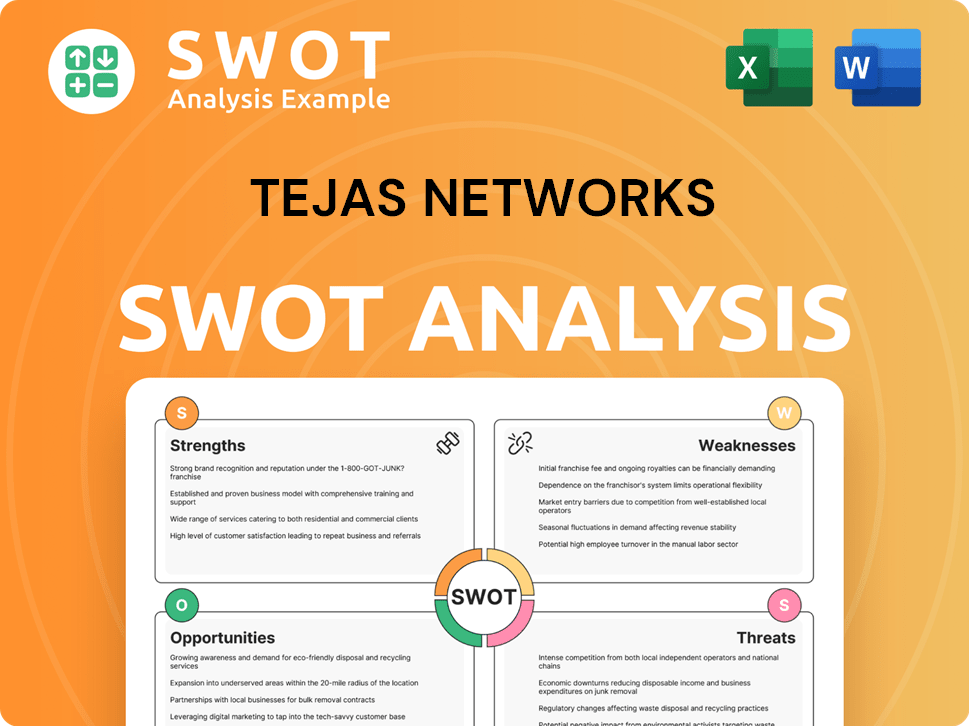
How Has Tejas Networks’s Ownership Changed Over Time?
The ownership structure of Tejas Networks underwent a significant transformation on July 29, 2021. Panatone Finvest Limited, a subsidiary of Tata Sons Private Limited, invested ₹1884 crore to acquire a 43.35% stake through shares and warrants. This initial investment marked a pivotal moment, setting the stage for a larger acquisition. This acquisition was a strategic move to bolster the company's financial standing and global reach, enabling expansion of its telecom product offerings.
By April 2022, Panatone Finvest Limited increased its shareholding to 52.45%, thereby securing a majority stake in Tejas Networks. This acquisition made Tejas Networks a part of the Tata Group. This strategic shift provided the company with access to the resources and relationships necessary for growth within the competitive telecommunications sector. This strategic alignment has significantly influenced the company's direction.
| Stakeholder | Shareholding (as of March 2025) | Notes |
|---|---|---|
| Promoters (Panatone Finvest Limited) | 53.83% | Majority owner, part of the Tata Group. |
| Foreign Institutional Investors (FIIs) | 7.08% | Held across 93 entities. |
| Mutual Funds | 4.3% | Held through 18 schemes. |
| Individual Investors | 23.55% | Significant retail investor presence. |
| Nippon Life India Trustee Ltd | 3.64% | Major institutional investor. |
| Government Pension Fund Global | 1.95% | Institutional investor. |
| Kedia Securities Private Limited | 1.02% | Institutional investor. |
As of March 2025, the ownership of Tejas Networks is primarily controlled by Panatone Finvest Limited, a subsidiary of Tata Sons Private Limited, holding 53.83%. Other significant stakeholders include Foreign Institutional Investors (FIIs) at 7.08%, Mutual Funds at 4.3%, and individual investors with 23.55%. The market capitalization of Tejas Networks as of April 11, 2025, was ₹14,712 crore. For more insights into the business, consider exploring the Revenue Streams & Business Model of Tejas Networks.
The Tata Group's acquisition of a majority stake in Tejas Networks was a strategic move. The ownership structure includes significant holdings by institutional and individual investors.
- Tata Group's majority ownership provides strong financial backing and strategic direction.
- Foreign Institutional Investors and Mutual Funds hold considerable stakes.
- Individual investors also play a significant role in the company's ownership.
Tejas Networks PESTLE Analysis
- Covers All 6 PESTLE Categories
- No Research Needed – Save Hours of Work
- Built by Experts, Trusted by Consultants
- Instant Download, Ready to Use
- 100% Editable, Fully Customizable
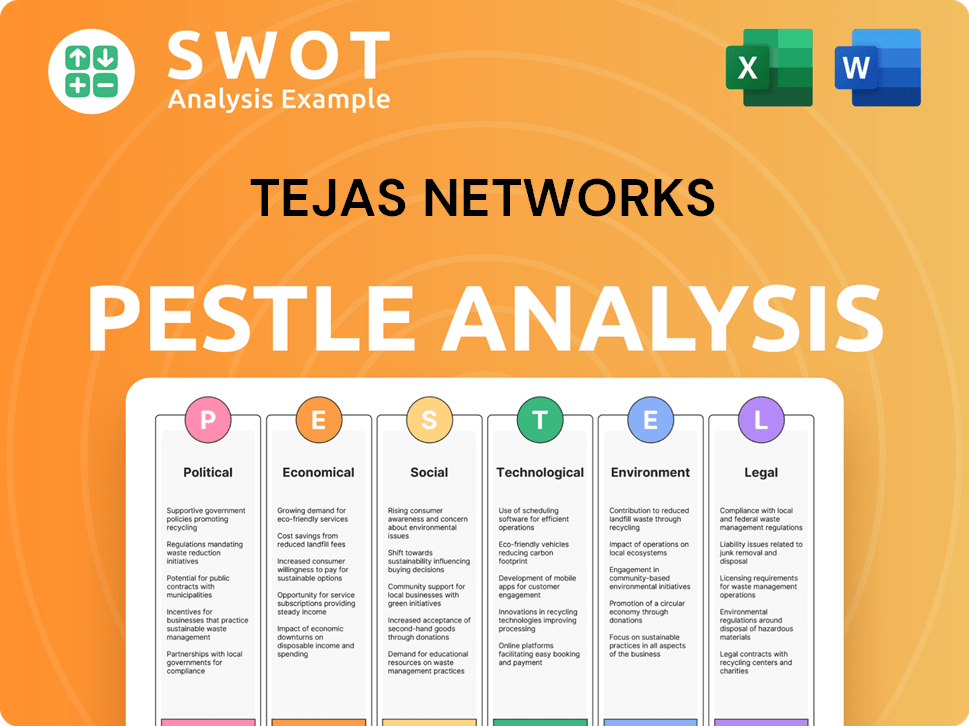
Who Sits on Tejas Networks’s Board?
The current board of directors of Tejas Networks includes a blend of representatives from major shareholders, founders, and independent members. As of June 7, 2025, the board comprises 6 active members. Key figures include Arnob Roy, a co-founder serving as Executive Director and COO, and interim CEO following Anand Athreya's resignation. Anand Athreya previously held the CEO and MD positions, joining in 2023, and Sanjay Nayak, another co-founder, was CEO & MD until 2023. Additionally, Kumar N. Sivarajan serves as CTO. Independent board members include Prathivadibhayankara Rajagopalan Ramesh, Alice Geevarghese Vaidyan, Ramamurthi Bhaskar, and Ganapathy Subramaniam Natarajan.
The leadership structure reflects a balance between continuity and new direction, with the founders playing a significant role alongside independent oversight. The board's composition is designed to ensure strategic guidance and effective governance, considering the company's evolving market position and growth objectives. The presence of independent directors ensures a degree of impartiality in decision-making, which is crucial for stakeholder confidence and regulatory compliance.
| Board Member | Title | Role |
|---|---|---|
| Arnob Roy | Executive Director & COO | Interim CEO |
| Kumar N. Sivarajan | CTO | |
| Prathivadibhayankara Rajagopalan Ramesh | Independent Director | |
| Alice Geevarghese Vaidyan | Independent Director | |
| Ramamurthi Bhaskar | Independent Director | |
| Ganapathy Subramaniam Natarajan | Independent Director |
The voting structure of Tejas Networks is significantly influenced by the majority stake held by Panatone Finvest Limited, a subsidiary of Tata Sons. As of March 2025, promoters hold 53.83% of the company's shares. This substantial ownership by the Tata Group provides significant control and strategic influence over the company's decision-making processes. This ownership structure is a key factor in understanding the company's strategic direction and its ability to execute its business plans. For more insights into the company's strategic positioning, consider reading about the Target Market of Tejas Networks.
The Tata Group, through Panatone Finvest Limited, has a controlling stake in Tejas Networks.
- Promoters hold a significant percentage of shares, influencing key decisions.
- The board includes a mix of founders, representatives, and independent members.
- Understanding the ownership structure is crucial for assessing strategic direction.
- The Tata Group's influence shapes the company's long-term vision.
Tejas Networks Business Model Canvas
- Complete 9-Block Business Model Canvas
- Effortlessly Communicate Your Business Strategy
- Investor-Ready BMC Format
- 100% Editable and Customizable
- Clear and Structured Layout
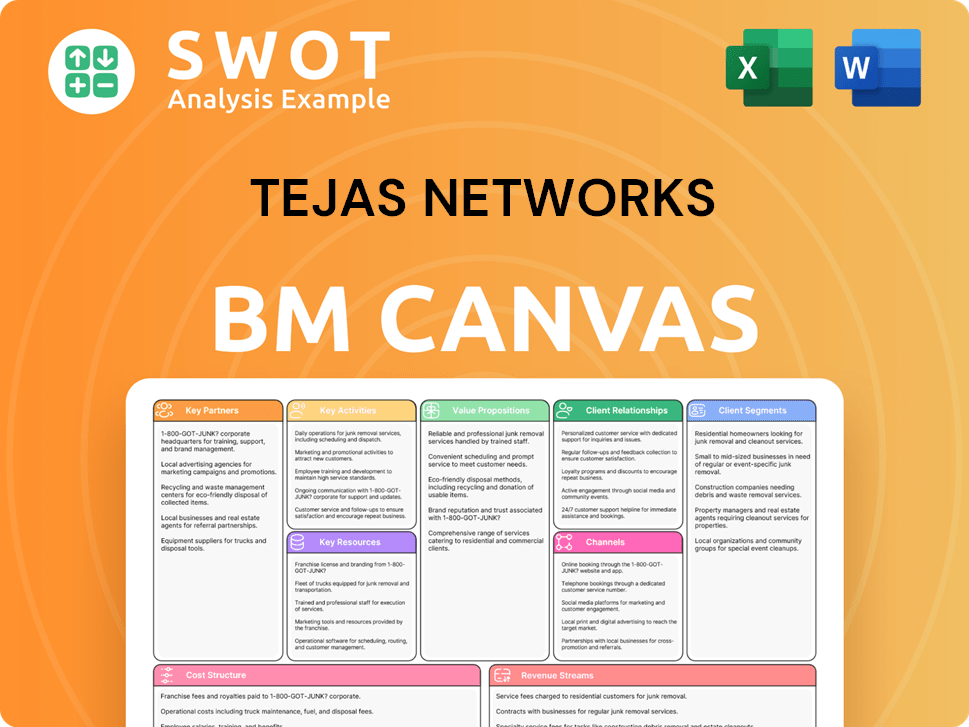
What Recent Changes Have Shaped Tejas Networks’s Ownership Landscape?
Over the past few years, the ownership of Tejas Networks has undergone significant changes. The most notable development is the strategic investment by the Tata Group. Through Panatone Finvest Limited, Tata Sons began acquiring a controlling stake in Tejas Networks in July 2021, reaching a 52.45% ownership by April 2022. This acquisition made Tejas Networks a part of the Tata Group, providing it with enhanced financial resources and expanding its global reach.
Recent trends in Tejas Networks ownership show some shifts. Promoter holdings decreased slightly from 54.01% in December 2024 to 53.83% in March 2025. Foreign Institutional Investors (FIIs) also reduced their holdings from 8.04% to 7.08% during the same period. Mutual Funds saw a minor decrease, while individual investors held 23.55% of the shares as of March 2025. These changes reflect ongoing adjustments in the shareholder structure of the company.
| Shareholder Category | December 2024 | March 2025 |
|---|---|---|
| Promoters | 54.01% | 53.83% |
| Foreign Institutional Investors (FIIs) | 8.04% | 7.08% |
| Mutual Funds | 4.36% | 4.30% |
| Individual Investors | N/A | 23.55% |
In March 2025, Tejas Networks received ₹123.45 crore under the Production Linked Incentive (PLI) Scheme for telecom and networking products for FY 2023-24. The company is eligible for ₹367.7 crore under the PLI for 9M FY2025. Furthermore, in August 2023, Tejas Networks secured a significant ₹7,492 crore contract for supplying 4G/5G Radio Access Network (RAN) equipment for BSNL's pan-India network, with deliveries expected in FY25. The company reported revenues of ₹8,968.63 crore (US$1.1 billion) and a net profit of ₹446.53 crore (US$53 million) for FY25. For more insights into the company's strategic direction, you can read about the Growth Strategy of Tejas Networks.
Tata Sons, through Panatone Finvest Limited, acquired a controlling stake in Tejas Networks, making it a Tata Group company.
Promoter holdings saw a slight decrease, while FIIs and Mutual Funds also adjusted their stakes.
The company reported revenues of ₹8,968.63 crore (US$1.1 billion) and a net profit of ₹446.53 crore (US$53 million) for FY25.
The company secured a major contract with BSNL and entered a technology collaboration with NEC Corp.
Tejas Networks Porter's Five Forces Analysis
- Covers All 5 Competitive Forces in Detail
- Structured for Consultants, Students, and Founders
- 100% Editable in Microsoft Word & Excel
- Instant Digital Download – Use Immediately
- Compatible with Mac & PC – Fully Unlocked
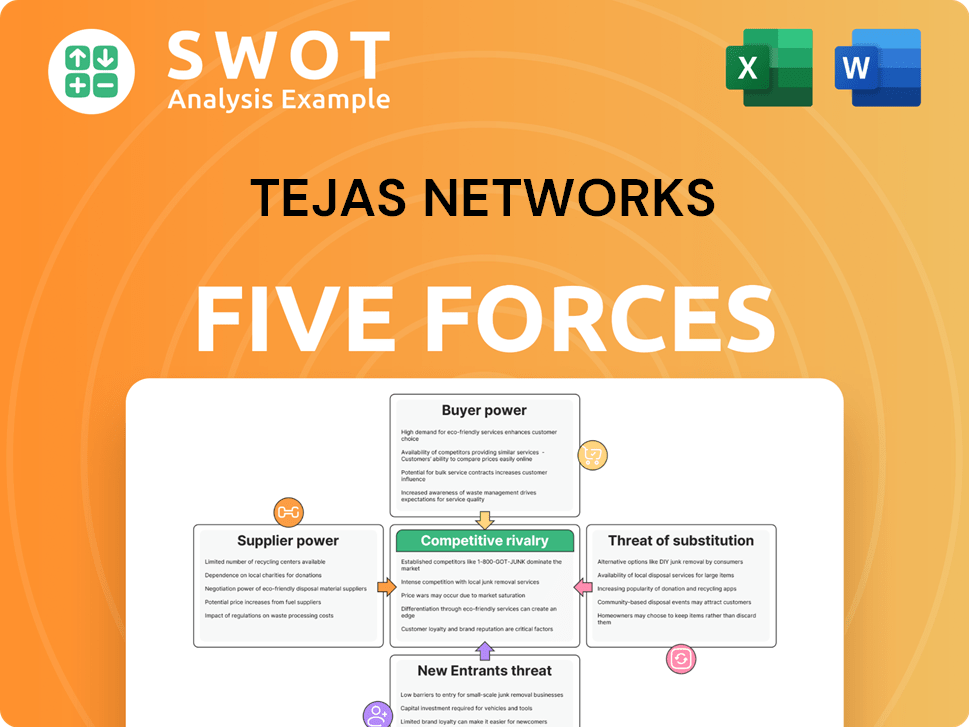
Related Blogs
- What are Mission Vision & Core Values of Tejas Networks Company?
- What is Competitive Landscape of Tejas Networks Company?
- What is Growth Strategy and Future Prospects of Tejas Networks Company?
- How Does Tejas Networks Company Work?
- What is Sales and Marketing Strategy of Tejas Networks Company?
- What is Brief History of Tejas Networks Company?
- What is Customer Demographics and Target Market of Tejas Networks Company?
Disclaimer
All information, articles, and product details provided on this website are for general informational and educational purposes only. We do not claim any ownership over, nor do we intend to infringe upon, any trademarks, copyrights, logos, brand names, or other intellectual property mentioned or depicted on this site. Such intellectual property remains the property of its respective owners, and any references here are made solely for identification or informational purposes, without implying any affiliation, endorsement, or partnership.
We make no representations or warranties, express or implied, regarding the accuracy, completeness, or suitability of any content or products presented. Nothing on this website should be construed as legal, tax, investment, financial, medical, or other professional advice. In addition, no part of this site—including articles or product references—constitutes a solicitation, recommendation, endorsement, advertisement, or offer to buy or sell any securities, franchises, or other financial instruments, particularly in jurisdictions where such activity would be unlawful.
All content is of a general nature and may not address the specific circumstances of any individual or entity. It is not a substitute for professional advice or services. Any actions you take based on the information provided here are strictly at your own risk. You accept full responsibility for any decisions or outcomes arising from your use of this website and agree to release us from any liability in connection with your use of, or reliance upon, the content or products found herein.